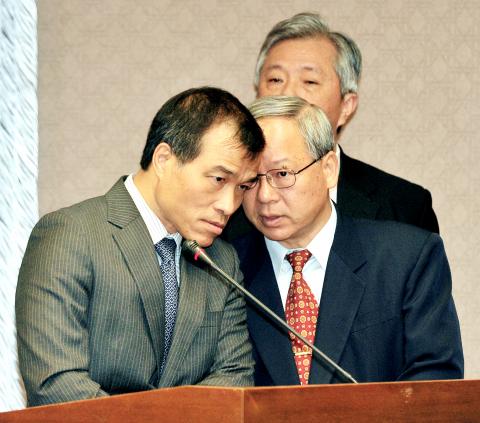The government is to step up security measures on railway systems by increasing the number of surveillance cameras on trains and possibly introducing passenger security checks, Minister of Transportation and Communications Yeh Kuang-shih (葉匡時) said yesterday.
Yeh made the comments during a legislative question-and-answer session that focused on an incident on Friday in which homemade explosive devices were found in suitcases in a restroom on a Taiwan High Speed Rail (THSR) train.
About three hours after the two suitcases containing explosive devices and gasoline were discovered on the train, two similar bombs were found in front of the office of Chinese Nationalist Party (KMT) Legislator Lu Chia-chen (盧嘉辰) in New Taipei City (新北市).

Photo: Chien Jung-fong, Taipei Times
Lu said it was the most serious security incident in the nation’s transportation history.
Democratic Progressive Party (DPP) Legislator Lee Kun-tse (李昆澤) said that if an explosion occurred on a fully-loaded train traveling at a speed of almost 300kph it could cost about 1,000 lives.
He said the government should strengthen police patrols, improve and increase surveillance and monitoring systems and hold regular security drills.
In response, Yeh said that because the police force does not have sufficient manpower, more security guards would be employed to strengthen security at THSR and Taiwan Railways Administration stations.
Since subway systems fall under the jurisdiction of local governments, the Ministry of Transportation and Communications would also coordinate with local governments to increase the number of security personnel in subway systems within a month, Yeh added.
On the issue of passenger security checks, Yeh said that China is the only country in the world that employs this measure.
However, “we could consider doing the same,” Yeh said, adding that the ministry would study the feasibility of installing X-ray scanners at every station along railway lines and would come up with a report in a month’s time.
The Bureau of High Speed Rail is considering installing surveillance systems in trains’ luggage areas and at its stations’ entrances and exits, bureau Director-General Chu Shu (朱樹) said.
However, it is unlikely that surveillance systems will be installed in train carriages, in consideration of personal privacy and also because new surveillance systems are not compatible with the old train carriages, he said.

Taiwan is stepping up plans to create self-sufficient supply chains for combat drones and increase foreign orders from the US to counter China’s numerical superiority, a defense official said on Saturday. Commenting on condition of anonymity, the official said the nation’s armed forces are in agreement with US Admiral Samuel Paparo’s assessment that Taiwan’s military must be prepared to turn the nation’s waters into a “hellscape” for the Chinese People’s Liberation Army (PLA). Paparo, the commander of the US Indo-Pacific Command, reiterated the concept during a Congressional hearing in Washington on Wednesday. He first coined the term in a security conference last

Prosecutors today declined to say who was questioned regarding alleged forgery on petitions to recall Democratic Progressive Party (DPP) legislators, after Chinese-language media earlier reported that members of the Chinese Nationalist Party (KMT) Youth League were brought in for questioning. The Ministry of Justice Investigation Bureau confirmed that two people had been questioned, but did not disclose any further information about the ongoing investigation. KMT Youth League members Lee Hsiao-liang (李孝亮) and Liu Szu-yin (劉思吟) — who are leading the effort to recall DPP caucus chief executive Rosalia Wu (吳思瑤) and Legislator Wu Pei-yi (吳沛憶) — both posted on Facebook saying: “I

Sung Chien-liang (宋建樑), who led efforts to recall Democratic Progressive Party (DPP) Legislator Lee Kun-cheng (李坤城), was released on bail of NT$80,000 today amid outcry over his decision to wear a Nazi armband to questioning the night before. Sung arrived at the New Taipei District Prosecutors’ Office for questioning in a recall petition forgery case last night wearing a red armband bearing a swastika, carrying a copy of Adolf Hitler’s Mein Kampf and giving a Nazi salute. Sung left the building at 1:15am without the armband and covering the book with his coat. Lee said today that this is a serious

A mountain blaze that broke out yesterday morning in Yangmingshan National Park was put out after five hours, following multi agency efforts involving dozens of fire trucks and helicopter water drops. The fire might have been sparked by an air quality sensor operated by the National Center for High-Performance Computing, one of the national-level laboratories under the National Applied Research Laboratories, Yangmingshan National Park Headquarters said. The Taipei City Fire Department said the fire, which broke out at about 11am yesterday near the mountainous Xiaoyoukeng (小油坑) Recreation Area was extinguished at 4:32pm. It had initially dispatched 72 personnel in four command vehicles, 16